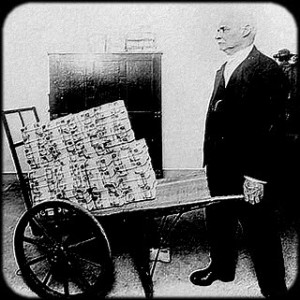 There’s good news in the Pacifica radio network’s latest financial audit. Listener donations to the five listener supported radio station non-profit rose in 2010 from their catastrophic drop of almost $4 million between 2008 and 2009. The donation total was $10,585,979 in 2010, up from $9,808,729 in 2009. That doesn’t compensate, of course, for the free fall from 2008, when listeners donated $13,603,287 to the network. But it’s a marked improvement.
There’s good news in the Pacifica radio network’s latest financial audit. Listener donations to the five listener supported radio station non-profit rose in 2010 from their catastrophic drop of almost $4 million between 2008 and 2009. The donation total was $10,585,979 in 2010, up from $9,808,729 in 2009. That doesn’t compensate, of course, for the free fall from 2008, when listeners donated $13,603,287 to the network. But it’s a marked improvement.
But while insisting that station staff tighten their belts, the Pacifica Foundation’s governance sector is still clearly unable to control its own internal expenses. The Pacifica radio network’s newest audit indicates that for the year ending in September 2010 the organization spent no less than $378,023 on its station subscriber and staff elected boards. This brings the total price tag for the network’s experiment in democracy to $2,802,685 since it commenced in 2002. Another year like the last six, and it will easily surpass $3 million in 2011.
And although Pacifica officials make noises from time to time about cutting board expenses, 2010’s board/election budget was the third most expensive in Pacifica history—over $112k more than the previous year. The “national division” spent a whopping $175k on board expenses. In 2009 it was $94,859.
| Pacifica board expenses by year | ||
| 2010 “board meetings and elections” | 378,023 | |
| 2009 “board expense” | 265,687 | |
| 2008 “board expense” | 377,977 | |
| 2007 “National board expenses” (230,695)
and “board election expenses” (153,256) |
383,951 | |
| 2006 “National board expenses” (275,124)
and “board election expenses” (47,578) |
322,702 | |
| 2005 “National board expenses” (224,677)
and “board election expenses” (183,941) |
408,618 | |
| 2004 “National board expenses” (119,133)
and “board election expenses” (206,571) |
325,704 | |
| 2003 “National board expenses” | 161,918 | |
| 2002 “National board expenses” | 178,105 | |
| Total |
|
Here’s how these board/election expenses played out on a station by station level for 2010:
KPFA (Berkeley, CA): $40,431
KPFK (Los Angeles, CA): $45,956
KPFT (Houston, TX): $22,548
WBAI (New York City, NY): $76,183
WPFW (Washington, DC): $26,500
National Division: $175,405
WBAI’s board expenses almost doubled in 2010, up from 38,422 the previous year.
In the past, critics of my articles on this matter have all but characterized Pacifica’s board costs as a bargain, contending that they represent a relatively small portion of the network’s annual expenses. This assumes, of course, that the cash strapped network can afford to spend something like $378k per year on what passes for governance rather than programming.
To give you an idea of what $40,431 means to KPFA, consider the justification that Pacifica management recently gave for the layoff of the entire KPFA Morning Show crew last December:
Eliminating the former Morning Show was the most cost-effective programming change we could make at KPFA. Three part-time positions were eliminated (two hosts and one producer) or 2.3 full-time-equivalent positions, each with full benefits as all employees working at least half-time receive full health benefits. This saves KPFA approximately $147k per year in salaries, payroll taxes and health benefits.
In retrospect, it’s difficult to see how that move was worth the subsequent trouble. Since then, one of those staffers has been rehired following a union grievance that staff estimate cost KPFA over $32,000. Another’s case is in arbitration. Protestors of the layoffs have collected over $60k in donation promises, forthcoming upon the return of the popular programmers in question.
But while Pacifica claims that it couldn’t afford these individuals, apparently it thinks that it can afford a substantial percentage of their estimated costs on board members, whose contributions to the organization are dubious at best. Hopefully the network will take a serious look at these priorities before Pacifica embarks on its next expensive round of subscriber and staff elections, scheduled for next year. Pacifica management has just announced a drastic makeover of KPFA’s schedule, without having consulted most of the station’s listeners or staff—hardly evidence that the folks at the top are taking the democratic principles implied by the election experiment seriously.
Dear Radio Survivor readers. Please be civil in your responses to this article. As per our comment policy, foul language, epithets, name calling, and ad hominem attacks will be deleted.


